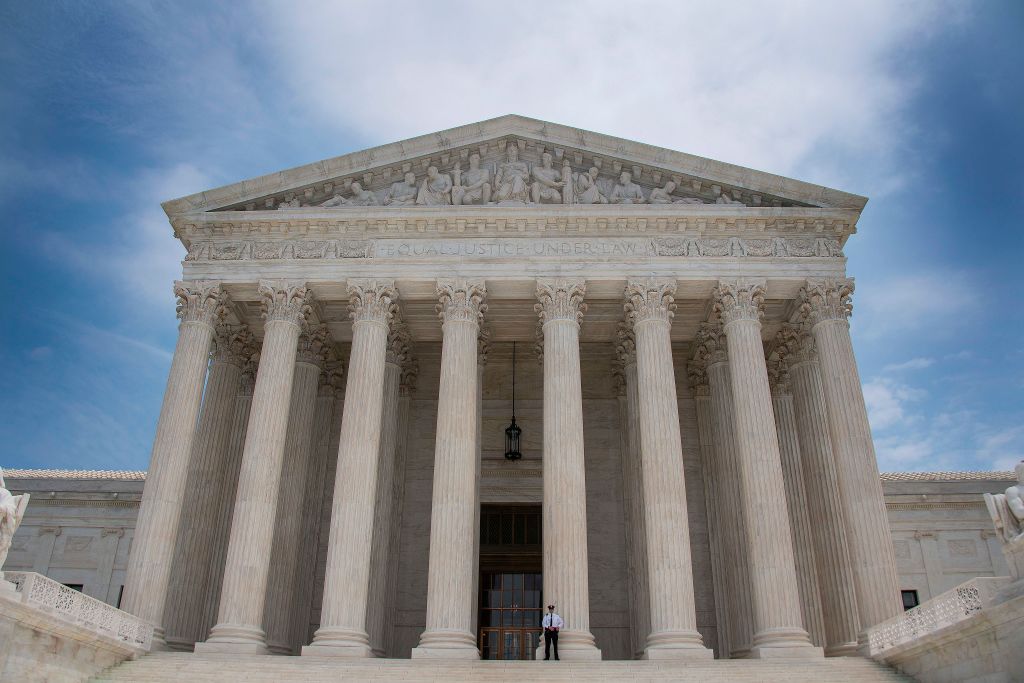The Supreme Court was the 'most functional branch of government' this term


The Supreme Court's nine-month term ended Monday, marking a historic period of time for the judicial branch as the justices set a modern record for reaching consensus. Because the court operated with just eight justices for the majority of its term, the breakdown "probably required having a lot more discussion of some things and more compromise and maybe narrower opinions than we would have issued otherwise," said Justice Samuel A. Alito Jr.
The term had the highest share of unanimous cases ever after 2013, but it also had the highest share of votes in the majority opinion in at least 70 years, The New York Times reports. Additionally, the share of cases decided by a margin of 5-3 or 5-4 was well below the court's average.
"It has been a quiet term, and that is a good thing for the country," said University of Chicago law professor William Baude. "Overall, this year the court was the least dramatic, and most functional, branch of government."
The Week
Escape your echo chamber. Get the facts behind the news, plus analysis from multiple perspectives.

Sign up for The Week's Free Newsletters
From our morning news briefing to a weekly Good News Newsletter, get the best of The Week delivered directly to your inbox.
From our morning news briefing to a weekly Good News Newsletter, get the best of The Week delivered directly to your inbox.
That could soon change. Notably, the 2016-2017 term did not have the same high-profile cases of terms past, like recent gay rights, health care, and abortion rulings. "We got used to the idea that every year the court decides several of the biggest national political issues — six or seven consecutive 'terms of the century' — but this year saw a regression to the mean," said Cato Institute lawyer Ilya Shapiro.
That won't last, though. The court has agreed to hear cases on "a clash between gay rights and claims of religious freedom, constitutional limits on partisan gerrymandering, cell phone privacy, human rights violations by corporations, and the ability of employees to band together to address workplace issues," The New York Times writes.
And that's not to mention the October arguments on President Trump's travel ban.
A free daily email with the biggest news stories of the day – and the best features from TheWeek.com
Jeva Lange was the executive editor at TheWeek.com. She formerly served as The Week's deputy editor and culture critic. She is also a contributor to Screen Slate, and her writing has appeared in The New York Daily News, The Awl, Vice, and Gothamist, among other publications. Jeva lives in New York City. Follow her on Twitter.
-
 How long can Keir Starmer last as Labour leader?
How long can Keir Starmer last as Labour leader?Today's Big Question Pathway to a coup ‘still unclear’ even as potential challengers begin manoeuvring into position
-
 Child-free train carriages: has push for adults-only spaces gone too far?
Child-free train carriages: has push for adults-only spaces gone too far?Talking Point Under-12s ban on premium commuter train carriages in France sparks backlash across the political divide
-
 The best family board games
The best family board gamesThe Week Recommends Put down the smartphones and settle in for some old fashioned fun
-
 ABC News to pay $15M in Trump defamation suit
ABC News to pay $15M in Trump defamation suitSpeed Read The lawsuit stemmed from George Stephanopoulos' on-air assertion that Trump was found liable for raping writer E. Jean Carroll
-
 Judge blocks Louisiana 10 Commandments law
Judge blocks Louisiana 10 Commandments lawSpeed Read U.S. District Judge John deGravelles ruled that a law ordering schools to display the Ten Commandments in classrooms was unconstitutional
-
 ATF finalizes rule to close 'gun show loophole'
ATF finalizes rule to close 'gun show loophole'Speed Read Biden moves to expand background checks for gun buyers
-
 Hong Kong passes tough new security law
Hong Kong passes tough new security lawSpeed Read It will allow the government to further suppress all forms of dissent
-
 France enshrines abortion rights in constitution
France enshrines abortion rights in constitutionspeed read It became the first country to make abortion a constitutional right
-
 Texas executes man despite contested evidence
Texas executes man despite contested evidenceSpeed Read Texas rejected calls for a rehearing of Ivan Cantu's case amid recanted testimony and allegations of suppressed exculpatory evidence
-
 Supreme Court wary of state social media regulations
Supreme Court wary of state social media regulationsSpeed Read A majority of justices appeared skeptical that Texas and Florida were lawfully protecting the free speech rights of users
-
 Greece legalizes same-sex marriage
Greece legalizes same-sex marriageSpeed Read Greece becomes the first Orthodox Christian country to enshrine marriage equality in law
